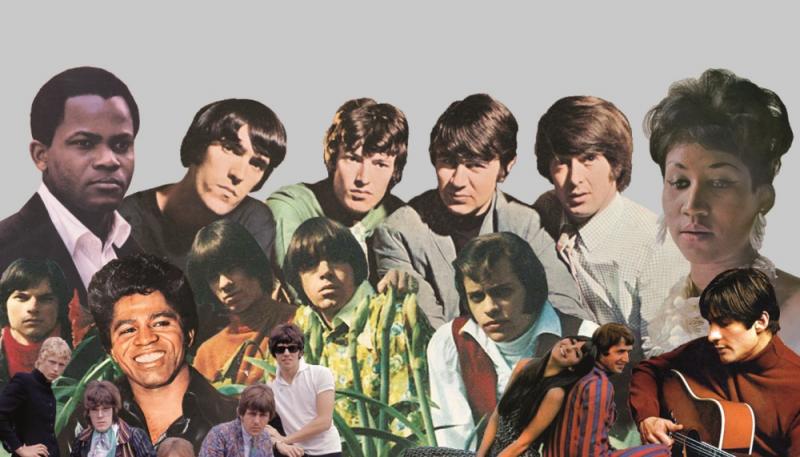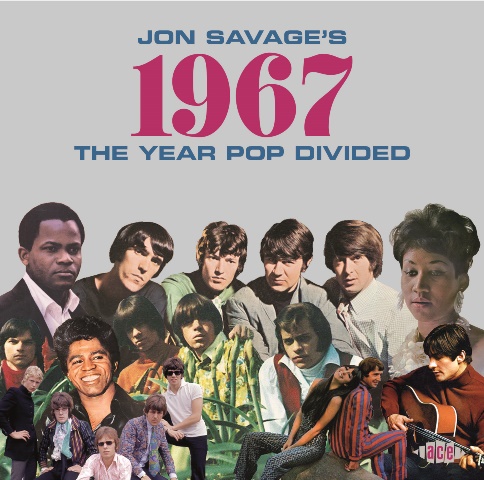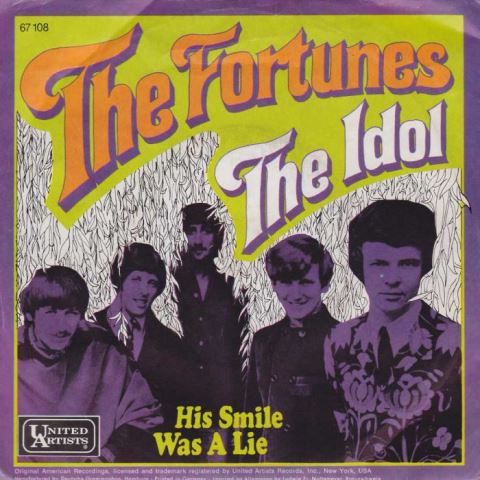Reissue CDs Weekly: Jon Savage's 1967 | reviews, news & interviews
Reissue CDs Weekly: Jon Savage's 1967
Reissue CDs Weekly: Jon Savage's 1967
Delightful and enlightening compilation pinpointing ‘The Year Pop Divided’

As 1967 ended, The Beatles’ “Hello Goodbye” sat at the top of the British singles chart and Billboard’s Hot 100 in America. Musically trite – “blandly catchy”, declared the writer Ian MacDonald – the single’s banal lyrics pitched opposites against each other: yes, no; stop, go; goodbye, hello. Although Paul McCartney was saying little with the song, he was playing a game with inversion.
The new compilation Jon Savage's 1967: The Year Pop Divided meets another of 1967’s schisms head on. One which The Beatles were at the heart of. As Savage puts it, “1967 was the year the ‘60s divided. During those 12 months, the revenues from LP sales in Britain finally overtook those from 45s. It’s also the year when the British singles charts suddenly revealed a vacuum that, in March 1967, was filled by a Top 10 that included Englebert Humperdinck, Petula Clark, Harry Secombe, Vince Hill, the Seekers and other mum’s and dad’s records that you will not be hearing on this compilation.”
 He goes on to say, “Nevertheless, the single was still king…just. It took a while for albums to take over – this happened with the massive success of Sgt Pepper’s Lonely Hearts Club Band in the summer.” Over its two CDs and 48 tracks originally issued as A- and B-sides, The Year Pop Divided tracks a world where pop unblinkingly encompassed soul, oddballs like Captain Beefheart and the emergent rock. Crucially, the ambition which filled whole albums was still being channelled on one side of a single. On disc one, with the outlandish “Feelin’ Reelin’ Squeelin’”, The Soft Machine do just this.
He goes on to say, “Nevertheless, the single was still king…just. It took a while for albums to take over – this happened with the massive success of Sgt Pepper’s Lonely Hearts Club Band in the summer.” Over its two CDs and 48 tracks originally issued as A- and B-sides, The Year Pop Divided tracks a world where pop unblinkingly encompassed soul, oddballs like Captain Beefheart and the emergent rock. Crucially, the ambition which filled whole albums was still being channelled on one side of a single. On disc one, with the outlandish “Feelin’ Reelin’ Squeelin’”, The Soft Machine do just this.
Savage previously compiled 1966: The Year the Decade Exploded to accompany his book of the same title. This time, though, there is no book. His liner notes are enough. So is the music. Some tracks were hits, many were not. All are, as originally intended, in mono. Sequenced (mostly) chronologically in order of release, what’s heard is a refraction of what Savage heard on the radio as a kid. It also catches the period’s other great split: when pop burped up rock.
In 1967, it was still possible to be pop and transition to rock. The Who did so. By 1968, it became harder for popsters to become rockers. Whatever the quality of music, growing beards and dressing down in denim did not bridge the gap. Rock could be pop by dint of charting but, with the notable exception of Status Quo (not collected here), pop had a hard time converting to rock.
 The Year Pop Divided is a delightful and enlightening dip into a world where such boundaries are not yet quite codified. The diamond-hard pop-mod-soul-psychedelia of The Action’s “Never Ever” is followed by the aural swoon of Gladys Knight & The Pips “Take me in Your Arms and Love me”. The Marmalade’s complex, modal, shape-shifting and Hendrix-favoured “I See the Rain” precedes Four Tops’ despairing and intense “You Keep Running Away”.
The Year Pop Divided is a delightful and enlightening dip into a world where such boundaries are not yet quite codified. The diamond-hard pop-mod-soul-psychedelia of The Action’s “Never Ever” is followed by the aural swoon of Gladys Knight & The Pips “Take me in Your Arms and Love me”. The Marmalade’s complex, modal, shape-shifting and Hendrix-favoured “I See the Rain” precedes Four Tops’ despairing and intense “You Keep Running Away”.
On disc one, America’s The Third Bardo attempt to stand shoulder-to-shoulder with the loved-up, psychedelicised Eric Burdon on “I’m Five Years Ahead of my Time” but – as snot-nosed punks – instead end up hysterically barking they’ve discovered the meaning of life and that they’re through with caring about right or wrong. Less combative but also contemplative, the past-their-sell-by-date Fortunes struggle manfully on disc two with the hollowness of stardom on the marvellous “The Idol”.
Then, there’s The Troggs' inscrutable “Night of the Long Grass” which as is as much about everything and nothing as “Hello Goodbye”. Naturally, The Beatles are not here as it’s impossible to license their tracks. No matter. Without them, Jon Savage's 1967: The Year Pop Divided says more than enough about the year which, in Britain, opened with Tom Jones’ “Green Green Grass of Home” at number one. Happily, he and his ilk are absent from this gathering.
Share this article
The future of Arts Journalism
You can stop theartsdesk.com closing!
We urgently need financing to survive. Our fundraising drive has thus far raised £49,000 but we need to reach £100,000 or we will be forced to close. Please contribute here: https://gofund.me/c3f6033d
And if you can forward this information to anyone who might assist, we’d be grateful.

Subscribe to theartsdesk.com
Thank you for continuing to read our work on theartsdesk.com. For unlimited access to every article in its entirety, including our archive of more than 15,000 pieces, we're asking for £5 per month or £40 per year. We feel it's a very good deal, and hope you do too.
To take a subscription now simply click here.
And if you're looking for that extra gift for a friend or family member, why not treat them to a theartsdesk.com gift subscription?
more New music
 Album: Molly Tuttle - So Long Little Miss Sunshine
The US bluegrass queen makes a sally into Swift-tinted pop-country stylings
Album: Molly Tuttle - So Long Little Miss Sunshine
The US bluegrass queen makes a sally into Swift-tinted pop-country stylings
 Music Reissues Weekly: Chip Shop Pop - The Sound of Denmark Street 1970-1975
Saint Etienne's Bob Stanley digs into British studio pop from the early Seventies
Music Reissues Weekly: Chip Shop Pop - The Sound of Denmark Street 1970-1975
Saint Etienne's Bob Stanley digs into British studio pop from the early Seventies
 Album: Mansur Brown - Rihla
Jazz-prog scifi mind movies and personal discipline provide a... complex experience
Album: Mansur Brown - Rihla
Jazz-prog scifi mind movies and personal discipline provide a... complex experience
 Album: Reneé Rapp - Bite Me
Second album from a rising US star is a feast of varied, fruity, forthright pop
Album: Reneé Rapp - Bite Me
Second album from a rising US star is a feast of varied, fruity, forthright pop
 Album: Cian Ducrot - Little Dreaming
Second album for the Irish singer aims for mega mainstream, ends up confused
Album: Cian Ducrot - Little Dreaming
Second album for the Irish singer aims for mega mainstream, ends up confused
 Album: Bonniesongs - Strangest Feeling
Intriguing blend of the abstract, folkiness, grunge and shoegazing from Sydney
Album: Bonniesongs - Strangest Feeling
Intriguing blend of the abstract, folkiness, grunge and shoegazing from Sydney
 Album: Debby Friday - The Starrr of the Queen of Life
Second from Canadian electronic artist and singer offers likeable, varied EDM
Album: Debby Friday - The Starrr of the Queen of Life
Second from Canadian electronic artist and singer offers likeable, varied EDM
 Music Reissues Weekly: The Pale Fountains - The Complete Virgin Years
Liverpool-born, auteur-driven Eighties pop which still sounds fresh
Music Reissues Weekly: The Pale Fountains - The Complete Virgin Years
Liverpool-born, auteur-driven Eighties pop which still sounds fresh
 Album: Indigo de Souza - Precipice
US singer's fourth ups the pop ante but doesn't sacrifice lyrical substance
Album: Indigo de Souza - Precipice
US singer's fourth ups the pop ante but doesn't sacrifice lyrical substance
 Album: Mádé Kuti - Chapter 1: Where Does Happiness Come From?
Lively new album from the third generation of Nigeria's first musical family
Album: Mádé Kuti - Chapter 1: Where Does Happiness Come From?
Lively new album from the third generation of Nigeria's first musical family
 The Human League/Marc Almond/Toyah, Brighton Beach review - affable 1980s-themed seaside package
Retro pop extravaganza bolstered by a (mostly) balmy evening
The Human League/Marc Almond/Toyah, Brighton Beach review - affable 1980s-themed seaside package
Retro pop extravaganza bolstered by a (mostly) balmy evening
 Album: Alice Cooper - The Revenge of Alice Cooper
The original Alice Cooper band are back to fly the flag for all the weirdos
Album: Alice Cooper - The Revenge of Alice Cooper
The original Alice Cooper band are back to fly the flag for all the weirdos

Add comment